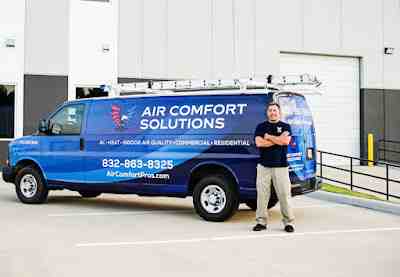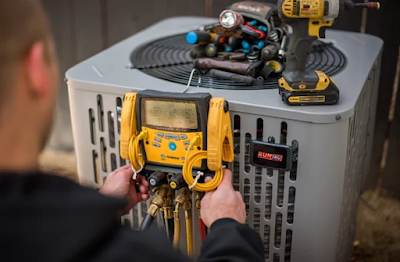Signs That Your AC Compressor Is Failing in Spring

When your air conditioner starts acting up, it’s not always a complete system failure that’s to blame. In many cases, the issue traces back to one of the most important parts of the unit—the compressor. During the warmer months in Spring, when your AC is working the hardest, this component is under constant stress. If it begins to fail, the performance of your entire cooling system takes a hit, leading to discomfort and higher energy bills.
Knowing what to look for when your AC compressor is having trouble can help you catch the issue early. Addressing the problem sooner keeps your home comfortable and saves you from more costly repairs down the road. Paying attention to strange sounds, inconsistent cooling, or other warning signs can go a long way in maintaining peace of mind while staying ahead of sudden breakdowns.
Understanding the AC Compressor and Its Role
The AC compressor is considered the heart of the cooling system. It takes in refrigerant as a low-pressure gas from your indoor unit, compresses it, and sends it to the condenser coil in the outdoor unit. There, it releases heat and transforms into a high-pressure liquid that moves through the system to help regulate your home's temperature. Without a working compressor, your AC cannot move refrigerant properly, which means it won’t cool your house effectively.
Its job involves constantly cycling on and off to manage temperature, especially during hotter months in Spring. When outdoor temperatures start to rise in Spring, your compressor works harder and longer. If it’s nearing the end of its life or isn’t in good shape, this added workload can speed up its decline.
In short, your AC might still blow air, but if the compressor isn’t doing its job, that air won’t be cool. Many homeowners mistake this for a minor issue like a dirty filter or closed vent, when in reality, a strained or failing compressor is often to blame. Understanding its role helps you notice early warning signs more confidently.
Common Signs of a Failing AC Compressor
Recognizing trouble early with your AC compressor can help you avoid a complete system breakdown. Look for these common warning signs around your home in Spring:
- Louder-than-usual noises: Grinding, squealing, or rattling sounds often point to a compressor issue. These noises can mean parts inside the compressor are loose or worn down.
- Reduced cooling power: If your house feels warm even though the AC is running, the compressor might not be keeping up. Warm air instead of cool air from your vents is a red flag.
- Weak airflow: A weakened compressor may not push refrigerant strongly enough to produce cold air, causing airflow to drop.
- System struggling to stay on: If your AC keeps tripping breakers or shuts off suddenly, the compressor may be overloading the system.
- Leaking refrigerant or oil: Pools of liquid around or under the outdoor unit could be leaking refrigerant or compressor oil, both signs of a failing part.
- Higher energy bills: If your energy use jumps with no obvious reason, a struggling compressor could be driving up usage behind the scenes.
Each of these symptoms can show up on its own or in combination. For example, one homeowner in Spring noticed increased indoor humidity along with a humming noise from the outside unit. A technician later discovered the compressor was beginning to fail. Ignoring any of these signs can lead to more damage not only to the compressor itself but to other parts of your cooling system. Acting quickly can help protect your home’s comfort and your budget.
Common Causes of AC Compressor Failure
Even though AC compressors tend to last a long time, several issues can shorten their lifespan. Understanding what leads to their failure can help you prevent unexpected breakdowns in Spring, especially when the heat starts to climb. One of the biggest contributors is lack of routine maintenance. Over time, dust, debris, and grime collect on your outdoor unit. This buildup restricts airflow, causing the compressor to work harder than it should.
Electrical issues are another common cause of compressor trouble. Power surges or loose wiring can burn out electrical components inside the unit. Once those parts are damaged, the compressor can’t operate like it’s supposed to. Another frequent issue is refrigerant imbalance. If your system is low on refrigerant due to a leak or overfilled from a previous repair, the pressure inside the compressor can become unstable. That pressure puts the system under stress and can eventually lead to compressor failure.
Other reasons include:
- Overheating due to dirty condenser coils or blocked vents on the outdoor unit.
- Broken valves or failing motor components inside the compressor.
- Old age and general wear after years of use.
- Moisture or contamination inside the system.
- Lack of lubrication, leading to internal friction and overheating.
Identifying what’s caused the failure helps when weighing the repair or replacement options. If a part can be fixed early, it can extend the life of the compressor and reduce the chance of a full system breakdown.
Ways To Prevent Compressor Failure
Staying ahead of issues with your air conditioning system in Spring is easier when you know how to care for it. Most compressor problems start small. If you catch them early, you can avoid major repairs later. A few preventive steps done on a regular basis go a long way.
Here’s what you can do:
1. Schedule seasonal maintenance. Having our professionals service your system before the weather heats up helps uncover hidden issues like low refrigerant levels or worn components.
2. Keep the area around your outdoor unit free of leaves, weeds, and debris. Air needs to circulate freely so the system doesn’t overheat.
3. Listen to your AC when it’s running. Odd noises or rattling should never be ignored.
4. Check your air filters and replace them often. Clogged filters can lead to system stress and reduced airflow.
5. Monitor your energy bills. When usage spikes for no clear reason, it's often a sign of something going wrong in the system, possibly the compressor.
6. Work with our technicians at the first sign something’s off. Waiting too long can allow damage to spread to other parts.
Taking these steps lowers the risk of compressor damage and helps keep your AC running when you need it most. When your cooling system stays efficient and responsive, you get better comfort and lower long-term costs.
Why You Need Professional AC Repairs In Spring
Some AC trouble goes beyond what you can spot or fix by looking at the thermostat or air filter. Compressor issues in particular call for expert troubleshooting. Since the parts are sealed and involve refrigerant, repairs should only be done by trained professionals. Our technicians use proper tools to measure voltage, test refrigerant levels, and locate leaks or worn-down connections.
You also avoid guessing games. For example, a bad capacitor can look like a compressor failure to the untrained eye. Replacing the wrong part wastes time and money. Getting the repair diagnosed properly from the beginning protects your AC system and shortens downtime.
Fixing a problematic compressor early can prevent damage to other major components like the condenser or evaporator. It might also make the difference between a repair you can manage and a full system replacement. A professional approach to AC repair in Spring helps your system stay safe, efficient, and quiet through the entire season.
Keep Your Cooling System Running Smoothly
Rooting out compressor problems early keeps your AC system strong during hot Spring days. It’s easy to assume that strange noises or warm air will fix themselves, but that delay can make things worse. Whether it’s old parts, low refrigerant, or worn internal components, most compressor issues start out small. When caught early, they don’t have to wreck summertime comfort or drain your wallet.
That’s why having regular inspections and quick repairs makes a big difference. It’s the smarter way to handle home cooling. You get steady performance and peace of mind knowing your system is ready for whatever the season throws your way. A well-maintained compressor keeps air moving, temperatures in check, and energy waste to a minimum. Don’t wait until comfort slips away before taking action. Acting today could save you from dealing with a major issue tomorrow.
If you notice any signs of a failing compressor this Spring, consider scheduling professional AC repair in Spring to take care of issues before they worsen. Trust Air Comfort Solutions LLC to keep your cooling system operating at peak performance. For a quick estimate or to book a service visit, please contact us today.













